
Since April 16, 2012, the day he announced his resignation as CEO of Engro Corporation, it has been widely known that if the Pakistan Tehreek-e-Insaf were ever elected to office, Asad Umar would be federal finance minister. But back then, barring the die-hard supporters, the idea of a PTI-led government seemed so far-fetched that hardly anyone gave it any serious thought as to what an Imran Khan administration would look like, and what it would mean to have Federal Finance Minister Asad Umar.
Well, that seemingly far-fetched idea has now become reality, and the nation’s economic decision-makers – from business leaders to managers to ordinary consumers – need to begin to think, in clear and specific terms, about what that means.
While many commentators have written about how the 2018 election is a milestone in Pakistan’s democratic development in many ways, not many have appreciated just how groundbreaking it has the potential to be on the economic policy front.
As we will examine further below, the job of finance minister is not to be liked. It requires making some of the toughest choices the government has to make, and to be the public face of those tough choices. (We hope Asad Umar has enjoyed being a beloved public figure. That is about to end abruptly and permanently.) To do the job well requires more than just personal competence and commitment to principles. It requires two other ingredients that have too often been missing on the economic policy front: democratic legitimacy, and the absolute trust of the prime minister.
Here is one fact that may get lost in all the noise about the PTI-led administration: if he is appointed and serves out his full term in office, Asad Umar will be the first full-time federal finance minister to be a member of the National Assembly since the Zulfikar Ali Bhutto Administration.
We have had members of the National Assembly take on the role of full-time finance minister temporarily (Naveed Qamar, for example), we have had senators serve as finance minister (Ishaq Dar), and we have had Benazir Bhutto serve concurrently as finance minister for almost the entirety of her time as prime minister, but to have one person who has both the legitimacy of being personally directly elected by the people (and not through other representatives, as in the case of senators) and is also the full-time finance minister has been surprisingly rare in Pakistani history.
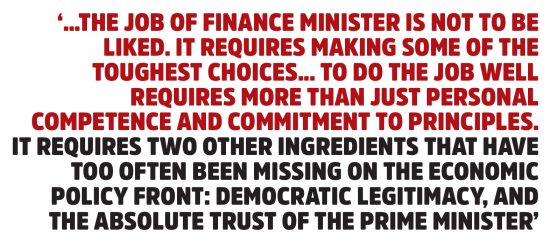
Why is that important? We will explain below. But in order to lay out what is likely to happen next, we at Profit have laid out three things that we believe our readers need to know: who is the man? What is the job? And what are the challenges facing the man in doing the job successfully?
The man himself
Asad Umar’s biography and career achievements are well known, but they are worth revisiting in detail in order to place them into the context of how they might be relevant to the job to which he is about to ascend (or the pit he is about to descend into, whichever metaphor you prefer).
Umar likes to speak of himself as being a person from an ordinary middle-class background who rose to the highest ranks of Corporate Pakistan before leaving a lucrative private-sector job to run for public office. In many respects, that story is true, but in some respects, it elides several important details.
For instance, while it is true that he is not from a wealthy family, Asad Umar is by no means from an ordinary family. His father was retired Major General Ghulam Umar, a man who was one of the seven senior-most officers in the Pakistan Army during the Yahya Khan administration.
General Umar’s career has been the subject of significant controversy long before his son became famous, and we will not delve into that controversy in any length here except to note that, while his name is mentioned in the Hamoodur Rahman Commission Report as a person who should face trial, it appears to be mostly as a function of his rank, and does not necessarily have anything to do with his specific individual behaviour. In fairness to Asad Umar, while he has defended his father against the insinuations leveled against him in the media, he has not in any way tried to whitewash the atrocities committed by the government, and specifically the military, during that era.
The reason we bring up Umar’s father’s career is to note the following fact: yes, they were middle class, but being the youngest son of a high-ranking Army officer in Pakistan does not qualify a person by any means as ordinary. One is, almost by default, a highly privileged member of the country’s ruling elite, even if one is not necessarily from a wealthy family.
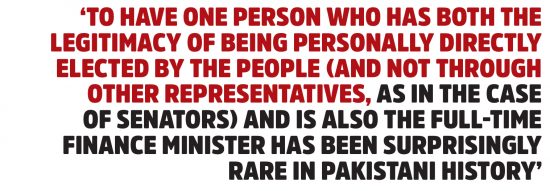
Nonetheless, Umar’s own career appears to have been largely the result of success in meritocratic environments. He secured admission to the Institute of Business Administration in Karachi during its heyday, graduating with an MBA in 1984. His first job out of college was at HSBC Pakistan, though he did not seem to enjoy banking enough to stay there very long (or quite possibly, it is because HSBC has never had a clue as to what they were doing in Pakistan, but we will revisit our grudge against HSBC another time.)
He does, however, remember being well-paid there. “I still remember the exact figure of my first salary: Rs8,170 per month. My boss at the time said ‘Well, frankly they are paying you too much.’,” he said in an interview with The Express Tribune in 2012. The equivalent amount in today’s terms, adjusted for inflation, would be Rs106,225 per month. We are inclined to agree with his old boss.
In 1985, he joined Exxon Chemicals Pakistan, the predecessor company to Engro. He was clearly a high-performer because he was given highly coveted assignments, including becoming the first non-engineer to be a business analyst at the fertilizer plant in Daharki, and being offered a secondment to Exxon’s facilities in Canada, the only Pakistani employee at the time to have been offered that opportunity.
In fact, he was in Canada in 1991 when the legendary management buyout of Engro happened. He returned to Pakistan to join the new management team build out what would become one of Pakistan’s most admired companies. In 1997, at the age of just 36, he was appointed the CEO of the company’s new petrochemical arm, Engro Polymer & Chemicals. And in 2004, at the age of just 43, he was appointed the CEO of Engro Corporation.
It is his track record as CEO that bears close scrutiny, because his perceived success there has been seen as the basis for his reputation as an intelligent technocrat who has made the transition towards politics. On that front, the numbers are certainly highly admirable. Under Umar’s leadership, Engro’s revenues grew from Rs13 billion in 2004 to Rs114 billion in 2011, growing at an annualised rate of nearly 36.4%. (Inflation during that time averaged 12.6% per year.)
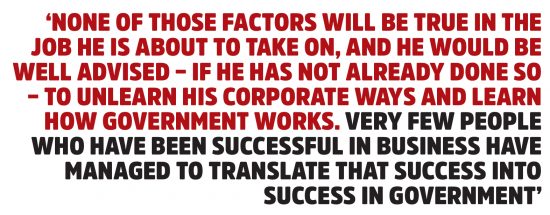
But there is more to a CEO than just numbers during his tenure, though that is certainly an important yardstick. There has now been enough time since his departure to judge Umar’s tenure as CEO on a more holistic level. On that front, while he made several important decisions as CEO, there are two that were larger and more important than all of the others: the first was to enter the food business by creating Engro Foods, and the second was to invest $1.1 billion in a new fertiliser plant.
The consequences of those two decisions can be described, mostly, as a mixed bag. Engro Foods, notwithstanding its recent stagnation, was clearly a smashing success and the result of Umar knowing what he did not know and hiring the right talent for the job, and then giving them the autonomy and the capital to take risks.
The investment in the fertiliser plant (called Enven in company parlance), notwithstanding its recent comeback, can only be categorised as a disaster. The company may well end up recovering the amount it invested in that project, but the amount of capital and management attention it sucked up in trying to get the government of Pakistan to honour its commitments to provide natural gas to the plant may not have been the best use of the company’s – and the country’s – resources.
Umar has acknowledged that the plant was not something he would have agreed to build in hindsight, but points out that there was no information at the time the decision was made (in 2006) that would have predicted the problems the plant would run into later, problems that had entirely to do with the government’s mismanagement of the country’s natural gas resources, and not necessarily any technical or management problems at Engro itself.
We revisit this career to point out the following fact: in every position he has held thus far where he has had success and failure, Asad Umar has had the ability to hire and fire whomever he pleased, he has worked alongside some of the most talented people in Pakistan, and he has had considerable authority over creating the incentive structures that his subordinates respond to.
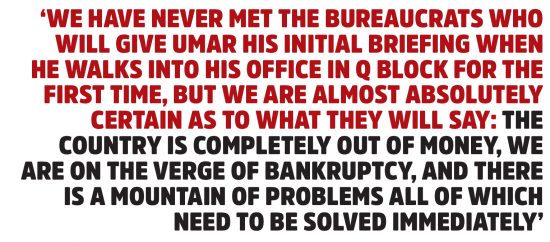
None of those factors will be true in the job he is about to take on, and he would be well advised – if he has not already done so – to unlearn his corporate ways and learn how government works. Very few people who have been successful in business have managed to translate that success into success in government.
The deliberately impossible nature of the job
We have never met the bureaucrats who will give Umar his initial briefing when he walks into his office in Q Block for the first time, but we are almost absolutely certain as to what they will say: the country is completely out of money, we are on the verge of bankruptcy, and there is a mountain of problems all of which need to be solved immediately.
Umar may be inclined to believe them because there is a lot of truth in what they say. The government of Pakistan is fundamentally insolvent, and virtually every previous administration in the country’s history has run macroeconomic policy very badly. In addition, every previous administration has also fudged the numbers to look better than they really are, and the bureaucrats will gleefully point this out as a problem, all the while pretending that they had nothing to do with any of these problems, and that they were just following orders of the previous government.
Like all good lies, most of what they say will be true. It will just not be the whole truth.
How do we know? The author of this essay has been following politics since at least 1996. Take a look at the tapes of the first press conferences about the economy given by Sartaj Aziz in 1997, Pervez Musharraf in 1999, Ishaq Dar in 2008, Hafeez Shaikh in 2010, and Dar again in 2013. They will sound eerily familiar: the government is out of money, the numbers are fudged, and there are mountains of problems that all need to be solved immediately.
How and why is that the case?
Because you may be the minister, Asad Umar, but your job was designed by the bureaucrats under you. And they deliberately designed it to be impossible for a single individual to do, so that you would be reliant on them to do most of the work, and make most of the important decisions.
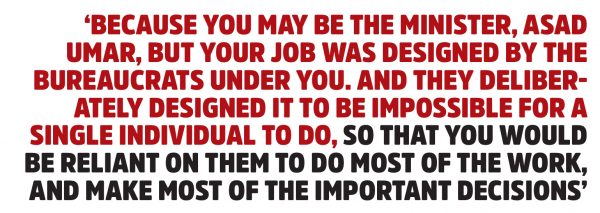
Why?
Because the finance ministry is the single most important ministry in the government, and the finance minister is the de facto deputy prime minister. Anything that happens in government needs money, and anything that needs money requires sign off from the finance ministry. The stakes are simply higher there. All people in proximity to power want more of it, and the bureaucrats who run the finance ministry are simply closer to more power than the bureaucrats in any other ministry.
Incidentally, the only ministry where financial decision-making is fully delegated after the budget? The Ministry of Defence.
And so, the more work that can be piled onto the finance minister’s desk, particularly at the beginning of his tenure, the better. The bureaucracy sees politicians like a body sees a virus: a foreign object that has no business being there and must be relentlessly attacked.
They do this by overwhelming the minister at the beginning of their tenure, bombarding them with issues that need to be addressed and tasks that need to get done. The goal is to get the finance minister to be exhausted by their job and then to catch them in a moment of weakness and offer to start taking tasks off their plate. In order to do that, the bureaucrats have designed the job to be impossible for one person to do.
The following is a partial and incomplete list of responsibilities of the Minister of Finance, Revenue & Economic Affairs of Pakistan:
* Lead of the Economic Coordination Committee (ECC) of the cabinet, which is effectively the most active part of the cabinet that makes all key economic policy decisions
* Lead the Executive Committee of the National Economic Council (ECNEC), the body that decides government spending priorities, particularly as they relate to development expenditure
* Supervise the process of budget creation and strategy for revenue generation by the Federal Board of Revenue
* Manage the perennial basket cases that are most state-owned companies, even if they are technically managed by other ministries, since all of those ministries will be reliant upon the finance ministry to provide technical expertise and guidance
* Effectively manage the country’s energy chain because so much of it is reliant on the government paying out subsidies to energy companies in order to be able to make up for the cost of theft; the finance minister is effectively making decisions on which companies get paid first, and thus making decisions about the fuel mix of the country’s power generation system
The job is at least three separate ministries combined into the job of one person and it is kept so structurally by both the bureaucrats who want the minister to hand off more of their powers to them, and the ministers themselves who do not want to delegate any powers to their cabinet colleagues.
To succeed at the job, one needs the following set of skills: an extremely strong work ethic, a very high sensitivity to bureaucratic nonsense, and a clear vision for precisely what one wants to achieve out of their tenure as finance minister.
It is a job where everyone will want to push their own agendas and make them seem urgent. Some of them truly will be urgent and hence the strong work ethic is needed. But many are things that can be reprioritised downwards.

It is highly likely that Asad Umar’s career in the private sector has given him the skills he needs to do the job, though he will need one additional quality which he may or may not have: a near-infinite amount of patience with obstructionism, lethargy, inertia, and incompetence.
The PTI has promised many structural reforms, but changing the fundamental structure of the Civil Service of Pakistan is explicitly not one of them. That means that the bureaucrats that the minister will be working with cannot be fired. He can try the Shahbaz Sharif technique of rapidly transferring bureaucrats until he finally gets one he likes, but that has its own problems. For starters, it assumes there are enough competent bureaucrats to fill all key positions and you just have to find them.
We have some very bad news. There are not.
That means making do with some of the most exceptionally incompetent human beings on the planet and hoping that the few competent officers around them will inspire them to work harder. That can sometimes work, as it appears to be in the case of Punjab and Khyber-Pakhtunkhwa’s education and health departments.
But finance is another beast entirely.
The core challenge of the job
We do not know how the minister thinks about his job. He did not respond to our requests for an interview with him, and his public statements do not give a detailed enough indication about his approach to the task at hand.
So the best we can advise is that he think of his job as two things, and see every task he is presented with in light of those two overarching goals: cutting out wasteful spending, and increasing the government’s tax revenue.
That is it.
If he can put in place sustainable policies that will do that, then he will be the most successful finance minister in the country’s history. Everything else is gravy.

This is the part where having the absolute trust of the prime minister is key. Because the finance minister has to do things that will not be popular, and will dent not just his own personal popularity but that of the government as a whole. The prime minister needs to be convinced that the actions being undertaken by the finance minister, while unpopular temporarily, will yield long-term benefits that will be good for the country, and thus good for the political fortunes of the ruling party.
The prime minister, in turn, has to be a skilled enough politician to be able to sell the short-term pain for long-term gain that is the basis of any successful path out of the kind of economic morass that Pakistan finds itself in.
On that front, we would suggest that Umar needs to focus on key areas of government expenditure that he can and should cut. We recommend starting with federal subsidies on energy and the constant bailouts given to state-owned companies every year. The PTI has already pledged to restructure state-owned enterprises, though the party is distinctly not in favour of privatisation. However, they have made no mention of subsidies and how they plan on dealing with those.
We can understand why. Privatisation means telling public sector union employees that their cushy, well-paid jobs that require them to do very little are going to be gone very soon, and they might – heaven forbid – actually have to work for a living like the rest of the country.
And cutting subsidies means telling the urban middle class – the core of the PTI’s support base – that they do not need or deserve to have the government paying a substantial chunk of their electricity bills and that they should pay their own bills, thank you very much.
You can see why any minister who successfully did that would need the prime minister to stand firmly behind them and not back out of those decisions.
But, as difficult as it may be, cutting expenses is child’s play compared to trying to raise revenue.
Let us ignore for a moment the fact that the PTI has explicitly refused to pledge to reform the civil service, and instead focus on the core of the problem: rich and upper middle class Pakistanis do not like to pay their taxes and need to be made to do so by force.
That means dragging some of the wealthiest, most educated people in the country out of their beds, kicking and screaming in front of their spouses and children in the middle of the night, and mercilessly throwing them in jail, and vigorously prosecuting them until they pay their fair share of taxes.
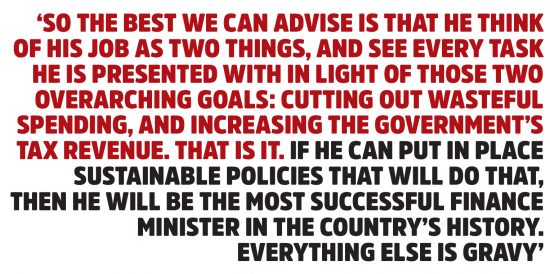
This does not need to be done with every tax thief in the country, but with just enough to put the fear of God and the FBR in the hearts of the rest of them.
Here is where you run into the big problem: almost every person who would matter as an example is also by definition very well-connected, and influential. The prime minister would be endorsing raids on the homes of every person who either already financially supported his campaign, or has the potential to be a major donor to his next campaign.
Needless to say, the political incentive to raise revenue does not align with the economic reality of needing to undertake the necessary reform.
And on this front, the PTI has been almost absolutely and completely silent.
In short, whatever else Asad Umar may say, unless he can answer where the tax money will come from, everything else will be more of the same.
The minister is already inheriting the purani ministry. If he fails to come up with a strategy for raising revenue, he will be the same as the purana minister himself.






















Absolutely loved this article. Very well written. May Allah help Pakistan and may Imran Khan deliver on his promises.
Good and very concise. Unlike many analysts, the writer raises the questions and answers with clear logic.
Absolutely loved this article. Very well written. May Allah help Pakistan and may Imran Khan
theurduguru
I think there is highly likely that certain political initiatives such as BISP, laptop scheme, taxi scheme, and all publicity stunts should be banned. They sidnt deliver anything except making people greedy of detting something withiut doing anything.
Best
True that. It made people act as educated beggers.
Thank you for simplifying it to us. We hope Asad Umar will take intelligent and bold steps to solve economic issues. I second your opinion that “The prime minister must be able to sell the SHORT-TERM PAIN FOR LONG-TERM GAIN, that is the basis of any successful path out of the kind of economic morass that Pakistan finds itself in.”
PTI, to sway voters of Punjab in next election, will spend more on infrastructure Mega Projects as compared to previous Government. Azad and Turncoats will demand funds for their constituencies. Middle Class will not like increase in taxes and withdrawal of subsidies on energy.
Asad and PTI have made unrealistic and fairy tale claims. I Hope they succeed..
The writer exhibits deep understanding of the inner workings of Finance Division or any govt department but also holds a grudge against bureaucracy due to its obstructionist approach. There is a reason why bureaucracy around the world is criticised for red-tapism and its inability to take decisive steps. This situation is further complicated in a developing country with weak civilian government constantly under stress from other power centres i.e. militablishment, judiciary and media.
Bureaucrats have to act according to law and cannot act beyond the confines of law even if common logic entails so. Political governments have an uncertain fate and it is bureaucrats who are left to answer on behalf of the departments and decisions of the ministers (who have not always been the ideal philosopher kings driven by the sole desire to set the house in order according to economic principles). There is a huge difference between running a private entity and incurring public expenditure when even there is such a huge trust deficit of public institutions as in Pakistan (some real and some created).
The writer must acknowledge there is no dearth of brains in the public sector but they are often wasted by not appointing right man for the right job. Moreover, the man heading Finance Ministry for over a decade Dr. Waqar Masood was from the private sector and we have had several ministers from private sector (Shaukat Aziz, Hafeez Pasha etc.)
Well written article. The challenges ahead need to be addressed with cautious approach . Cutting down extra expenses, leakages from the system is a good approach to start with. Increasing revenue base, requires vigorous efforts on reviving indigenous industries , attracting FDI, exploiting full potential of resources available across the country for which basic infrastructure facilities, ease of doing business, and strengthening functioning of regulatory bodies is essential. Path to success is waiting with steps in right direction by true Muslim and Patriot minister guided by divine wisdom and honest team .
the challenges will be there no doubt and correctly pointed out the bureaucracy issues and love the way you explained the MoF “country is completely out of money, we are on the verge of bankruptcy, and there is a mountain of problems all of which need to be solved immediately” this is what we hear when ever we do to Q block, but knowing Asad and his illustrious career he will overcome these obstacles as he has experience the advantage of team work and can identify good teams ….unlike his predecessors in the Q block who call themselves “aqual e “Q”ul “Knows every thing” – we should all back him for the sake of Pakistan May Allah give his wisdom and guide him to serve Pakistan ameen
….the challenges will be there no doubt and correctly pointed out the bureaucracy issues and love the way you explained the MoF “country is completely out of money, we are on the verge of bankruptcy, and there is a mountain of problems all of which need to be solved immediately” this is what we hear when ever we go to Q block, but knowing Asad and his illustrious career he will overcome these obstacles, he has experience of team work and can identify and make good teams ….unlike his predecessors in the Q block who call themselves “aqul e “Q”ul “Knows every thing” – we should all back him for the sake of Pakistan May Allah give him wisdom and guide him to serve Pakistan to the best of his abilities. Amen
No he wont be like purana minster as he is not a plunderer by profession. The article lost it in the start.
One key wrong deceision by the Naya minister may create a chain reaction across the whole structure. The paradoxes are real and complicated. It will certainly take more than competence and integrity to do the job right. Good luck and best wishes to the Naya minister
Comments are closed.